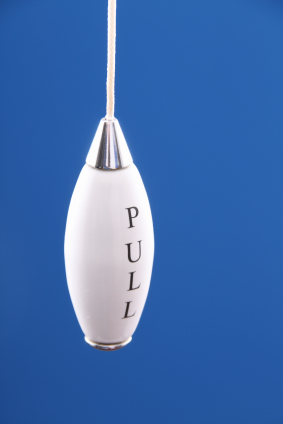AARP Hearing Center
By Dick Weinman, The Thin Edge of Dignity
“Just pull the cord when you’re done,” she says, as she leaves, and closes the door behind her. “I’ll be right back.” I sit obediently hoping that when I pull the cord, she will “be right back.”
“Just pull the cord” is the standard farewell when a caregiver finishes her assistance to a resident. It’s heard in every room, as the door is closed. Whenever someone needs help and the staff member who is asked is busy or has her mind elsewhere, you’ll hear her ask then say, “have you pulled your cord?” and “just pull the chord.”

In my situation, sitting on the toilet, “the cord” refers to the string in the bathroom which is attached to the string affixed to the side of the wall right above the handicap bar I grasp when sitting or rising to or from the toilet seat. (Fortunately it’s to the right of the toilet, since my left hand is mostly useless because of a traffic accident – no cord pulling.)
“Done” refers to the completion of the elimination function for which I pulled the cord affixed to wall in my living room to summon the caregiver, hopefully not too many minutes before: two to three is OK, five produces anxiety and crossed legs - hard to do in a wheelchair - eight to ten (which lately has been the norm) under-the-breath swearing, ten to twenty requires “Depends.” But at least at that point in the process of using the toilet, I sit on the Rho Hoh cushion of my wheelchair, not the hard plastic of the toilet seat which irritates the gluteus maximus as the minutes accumulate.
How did I get into this situation, I ask myself to pass the time – I’ve dutifully pulled the cord and I’m waiting for the “right back” to occur. The underlying and essential reason for me needing to pull a cord, not to flush, but to use, the toilet is: I was in a bad – more than bad, horrific - motor vehicle accident which just about obliterated any chance of regular bipedal mobility. (See blog 1, The Thin Edge of Dignity)
The more direct reason is that as my gender is male, I should urinate by standing at a urinal – there are none in the apartments at assisted living – or by standing over the toilet - seat up, of course.
But how can I stand over the toilet when I can’t stand? Besides there’s not enough strength in my hand to unbutton a button, unzip a zipper, and extricate my uh…uh…uh penis . (What in my socio-cultural inculcation makes me hesitate to say it like it is rather than wimpily substitute “thing,” or “business,” or whatever?)
So earlier, after I pulled the cord in the living room to get her attention, the caregiver pulled down my pants and I sat. I use the sitting position for whatever elimination process in which I engage (or as my son asks when I’m out and about and using a public restroom: 1 or 2?)
By this rambling explication, you must be able to tell I’m still waiting for “right back” to occur.
I don’t have Time or Newsweek or a large print edition of Reader’s Digest, nor did I bring into the bathroom my prosthetic page turner even if I had the magazines. And I certainly don’t want to chance losing my kindle among the detritus in the toilet. I’m stuck with my thoughts.
First, I realize that most of us can’t discern the passage of time, and events seem to pass more speedily than time is real. But as one who spent a career in radio, I’m haughty enough to believe I can accurately assess the flow of time. Besides my butt hurts.
Next, I grouse – a euphemism for the words that are bleeped on Comedy Central. I think of what I’ll say in the piece I’m working on for my writing class and practice the various options. I wonder if the caregiver’s pager works; if I pulled my cord at the same time someone else did, thus negating us both; if the caregiver is on her cell talking with a friend or texting, thus minimizing the importance of my call for assistance. I remind myself that someone failed to show for her shift and we are short staffed or that the shift was left short because not enough people could be found to take it. There’s a lot of brain wave chatter; it would rate a raise in the terrorism alert if this was internet chatter.
Finally I hear through the closed door of my apartment, the faraway sound of a pager ring, getting closer and closer. Then the expected rap on the door, as the caregiver knocks to warn of her incipient entrance. She pushes it open. “Welcome!” I smile and say. Not “ GRRR. It’s about time.” (I’m not that kind of guy; besides, I’m thankful she’s here.)
“Sorry,” says she. (Ah! Hah! She knows she’s late – guilty.)
Free at last, think I – until the next time I pull the cord.
* * * * * * * * * * * * * * * * * * * * * * * * * * * * * *
Just Pull The Cord is the latest article in a monthly series by Author Dick Weinman. To read his previous entry, click here.































































